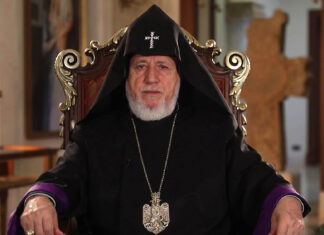On March 3, 2025, at the 58th Session of the United Nations Human Rights Council, U.N. High Commissioner for Human Rights Volker Türk called for the immediate release of “all those arbitrarily detained in Azerbaijan, including ethnic Armenians.” Türk preceded the comment by also offering an assurance: “We stand ready to support.” Full stop. It is a phrase with no context, meaning, or plan.
It’s no wonder, then, that Azerbaijan’s Foreign Ministry quickly picked up on Türk’s demand that only those detained “arbitrarily” should be released, with spokesman Aykhan Hajizada replying that a “fair trial in compliance with international legal standards is essential to establish the truth, bring justice to the victims, and ensure the rule of law”— a cynical statement, as it has been well-established in international circles that the trials of Armenian hostages in Baku since January 27, 2025, are being held in contravention of their rights under international law. Essentially, Türk’s “support” offered nothing practical for those unlawfully detained, and left an out for the Azerbaijani government to ignore the United Nations’ plea.
The United States has several tools at its disposal to compel Azerbaijani dictator Ilham Aliyev to end his hostage-taking and show trials.
Amnesty International’s advocacy was also hollow. It expressed support in January 2025 for the Armenian hostages, but forfeited any momentum it might have had if the statement had been released in September 2023, when Azerbaijani forces took Nagorno-Karabakh’s representatives hostage, including Ruben Vardanyan, billionaire, philanthropist, and former state minister. In saying that Azerbaijan’s “denying [Vardanyan] his fair trial rights, they are doing the exact opposite of justice,” the statement is better late than never, but Amnesty has no real power. The International Committee for the Red Cross also has been ineffectual by refusing to demand fulfillment of its mandate to help the hostages held in Azerbaijan’s prisons.
Human rights entities like Amnesty International, the Red Cross, and the United Nations Human Rights Council can do better to draw attention to the atrocities committed against the Armenians in immediate, clear, and unequivocal language and advocacy, but they have no real instruments to force Azerbaijan’s hand. The United States, however, does.








